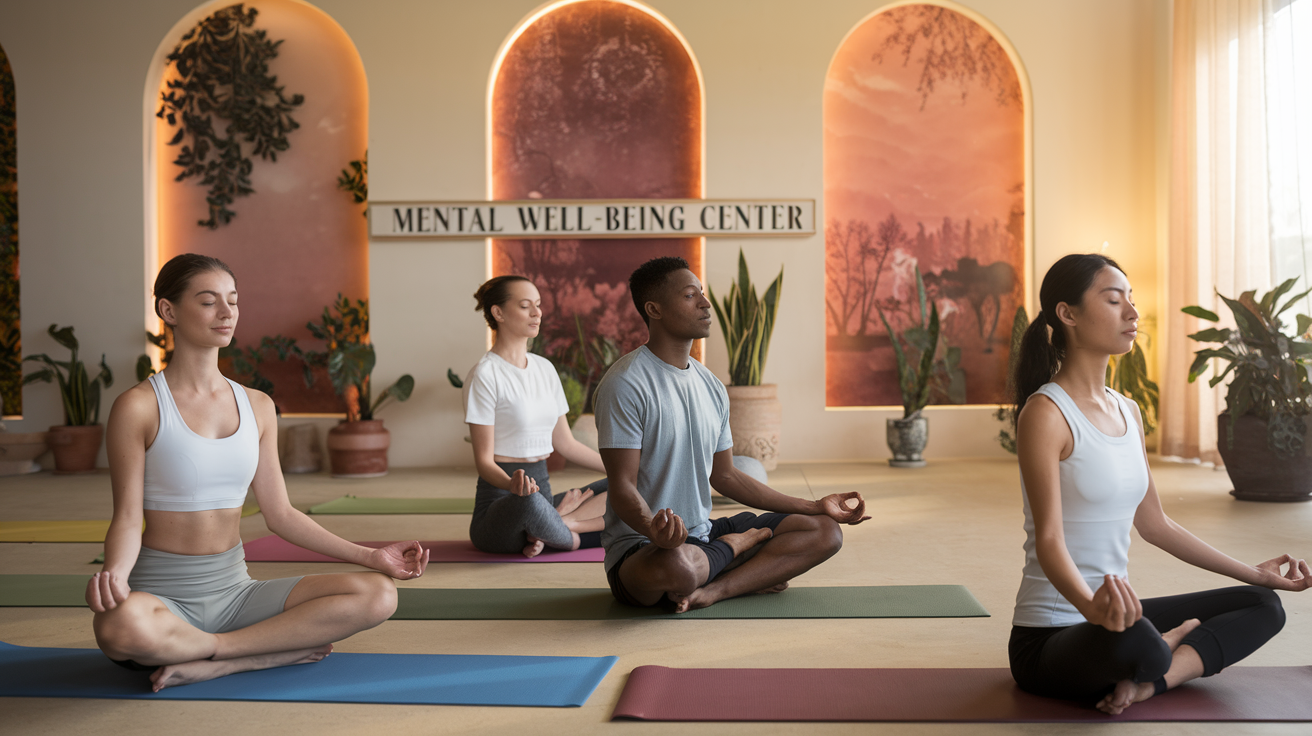Simple lifestyle changes that will help reduce stress


Table of Contents
In today’s fast-paced world, stress has become an unwelcome companion for many of us. 😓 The constant juggling of work, relationships, and personal responsibilities can leave us feeling overwhelmed and depleted. But what if there were simple, everyday changes you could make to significantly reduce your stress levels? 🤔
Imagine waking up each morning feeling refreshed, tackling your day with renewed energy, and finding moments of peace amidst the chaos. It’s not just a dream – it’s entirely possible! By incorporating a few key lifestyle adjustments, you can transform your relationship with stress and enhance your overall well-being. From boosting your physical activity to prioritizing mental health and embracing the healing power of nature, this blog post will guide you through 7 easy-to-implement strategies that can make a world of difference in your stress management journey. 🌿💪🧘♀️
Increase Physical Activity

A. Engage in regular exercise
Regular exercise is a powerful tool for stress reduction. According to the Mayo Clinic, physical activity not only improves overall health but also increases endorphin levels, providing a natural mood boost. Exercise effectively mimics the body’s stress responses, helping to mitigate negative impacts on various bodily systems, including cardiovascular, digestive, and immune functions.
To establish an effective exercise routine:
- Consult with a doctor if you have health concerns
- Start gradually and build up over time
- Aim for at least 150 minutes of moderate or 75 minutes of vigorous aerobic activity weekly
- Include strength training twice a week
- Choose enjoyable activities to promote adherence
| Exercise Type | Benefits |
|---|---|
| Aerobic | Reduces stress hormones, increases endorphins |
| Strength | Improves self-confidence, enhances overall fitness |
| Yoga | Promotes relaxation, improves flexibility |
B. Practice yoga for stress relief
Yoga is an excellent form of exercise for stress reduction. It combines physical movement with mindfulness, making it particularly effective in promoting relaxation. Yoga can help:
- Increase flexibility and strength
- Improve breathing techniques
- Enhance mental focus
- Reduce tension in muscles
Regular yoga practice can lead to a meditative state of mind, contributing to improved mood and better sleep quality, which are crucial for stress management.
C. Incorporate daily walks or outdoor activities
Adding daily walks or outdoor activities to your routine is a simple yet effective way to reduce stress. These activities offer multiple benefits:
- Provide a change of scenery
- Increase exposure to natural light
- Boost vitamin D levels
- Improve cardiovascular health
- Offer opportunities for social interaction
Even short bursts of outdoor activity can yield significant health benefits. The Mayo Clinic emphasizes that integrating physical activity into daily life is essential for managing stress effectively.
With this comprehensive approach to increasing physical activity, we can significantly reduce stress levels and improve overall well-being. Now that we have covered the importance of exercise in stress management, let’s explore how improving nutrition and diet can further contribute to stress reduction.
Improve Nutrition and Diet

Now that we’ve explored how increasing physical activity can help reduce stress, let’s delve into another crucial aspect of stress management: improving nutrition and diet.
A. Consume a balanced diet rich in whole foods
A balanced diet plays a significant role in managing stress levels. Focusing on whole foods can provide essential nutrients that support mental well-being. Here are some key components to include in your diet:
- Omega-3 fatty acids: Found in wild salmon and other fatty fish
- Magnesium-rich foods: Avocados and dark leafy greens like Swiss chard
- Protein sources: Red meat, chicken, eggs, and beans
- Fiber-rich foods: Vegetables, fruits, and legumes
- Probiotics: Yogurt and fermented foods like kimchi
| Food Group | Examples | Benefits |
|---|---|---|
| Fatty Fish | Wild salmon | High in omega-3s, supports brain health |
| Leafy Greens | Swiss chard | Rich in magnesium, helps regulate cortisol |
| Fermented Foods | Yogurt, kimchi | Provides probiotics, supports gut health |
| Antioxidant-rich Foods | Blueberries, broccoli | Protects against stress-related disorders |
B. Reduce caffeine and alcohol intake
While many rely on caffeine for energy and alcohol for relaxation, both can exacerbate stress and anxiety. Consider the following:
- Limit caffeine consumption, especially in the afternoon
- Reduce alcohol intake, as it can lead to mood swings and increased anxiety
- Replace these beverages with herbal teas or water infused with stress-reducing ingredients like matcha powder
C. Consider stress-reducing supplements (consult healthcare professional)
Certain supplements may help in managing stress levels. However, it’s crucial to consult with a healthcare professional before adding any supplements to your diet. Some potentially beneficial supplements include:
- Omega-3 fatty acids
- Magnesium
- Vitamin B12
- Probiotics
Remember, while dietary changes can significantly impact stress levels, they should be part of a holistic approach to stress management. As we transition to our next topic, prioritizing mental well-being, keep in mind that nutrition is just one piece of the puzzle in creating a stress-resilient lifestyle.
Prioritize Mental Well-being

Now that we’ve explored how improving nutrition and diet can help reduce stress, let’s delve into another crucial aspect of managing stress: prioritizing mental well-being.
Practice meditation and mindfulness techniques
Mindfulness, a meditation practice that emphasizes present-moment awareness without judgment, has been shown to significantly reduce stress. By implementing mindfulness techniques, you can disengage from negative or distracting thoughts that contribute to stress, anxiety, and depression. Research supports meditation’s effectiveness in alleviating various conditions, including:
| Condition | Benefit of Mindfulness |
|---|---|
| Stress | Reduced stress levels |
| Anxiety | Decreased anxiety symptoms |
| Pain | Improved pain management |
| Depression | Alleviated depressive symptoms |
| Insomnia | Enhanced sleep quality |
| Hypertension | Lowered blood pressure |
To incorporate mindfulness into your daily routine, try these simple exercises:
- Sensory engagement
- Living in the moment
- Self-acceptance
- Focusing on breathing
For more structured practices, consider body scan meditation, sitting meditation, or walking meditation. It’s recommended to practice mindfulness daily for about six months to foster a habit.
Implement deep breathing exercises
Deep breathing exercises are an essential component of mindfulness and stress reduction. The three-minute breathing space is a quick and effective technique that can fit into even the busiest schedules. This exercise encourages awareness and presence, providing a mental break from everyday stresses.
Journal to process thoughts and emotions
Journaling is a powerful tool for processing thoughts and emotions, contributing to overall mental well-being. By writing down your experiences, you can gain clarity and perspective on stressful situations. Consider incorporating these journaling practices:
- Gratitude journaling
- Emotional release writing
- Goal-setting and reflection
By prioritizing your mental well-being through these techniques, you’ll be better equipped to handle stress and maintain a balanced lifestyle. With this foundation of mental clarity and emotional stability, we can now explore how optimizing sleep and rest can further enhance your stress reduction efforts.
Optimize Sleep and Rest

Now that we have covered the importance of prioritizing mental well-being, let’s delve into another crucial aspect of stress reduction: optimizing sleep and rest. Quality sleep is intrinsically linked to our ability to manage stress effectively.
A. Establish a consistent sleep schedule
Maintaining a regular sleep routine is vital for reducing stress levels. Adults should aim for 7 to 7.5 hours of sleep per night. Inconsistent sleep patterns can lead to:
- Increased production of stress hormones like cortisol
- Weakened immune function
- Impaired emotional regulation
- Memory problems
To establish a consistent sleep schedule:
- Wake up at the same time daily, even on weekends
- Set a fixed bedtime that allows for adequate sleep
- Avoid drastic changes to your sleep routine
B. Create a relaxing bedtime routine
A calming pre-sleep ritual can significantly improve sleep quality and reduce nighttime stress. Consider incorporating these elements into your routine:
| Activity | Benefits |
|---|---|
| Mindfulness meditation | Reduces sleep disturbances |
| Guided meditation | Promotes relaxation through visualization |
| Gentle yoga or tai chi | Combines mindfulness with physical activity |
| Deep breathing exercises | Alleviates physical and mental tension |
| Progressive muscle relaxation | Releases physical stress |
Additionally, taking a warm shower before bed can help signal to your body that it’s time to wind down.
C. Minimize screen time before bed
Exposure to blue light from electronic devices can disrupt your sleep-wake cycle and increase stress levels. To optimize your sleep environment:
- Limit screen time at least 1-2 hours before bed
- Use blue light filters on devices if necessary
- Create a dark, quiet, and cool sleeping space
- Avoid alcohol and caffeine close to bedtime
Implementing these strategies can break the vicious cycle of poor sleep and increased stress, leading to better overall health and well-being.
As we transition to our next topic, it’s important to note that embracing nature and pets can complement these sleep optimization techniques, further enhancing our ability to manage stress effectively.
Embrace Nature and Pets

Now that we’ve explored the importance of optimizing sleep and rest, let’s delve into how embracing nature and pets can significantly reduce stress in our daily lives.
A. Spend time outdoors in natural settings
Immersing yourself in nature is a powerful tool for stress management. Research indicates that even brief exposure to natural environments can quickly regulate the sympathetic nervous system, alleviating stress and its negative effects on emotional well-being. To reap these benefits:
- Aim for at least 15 minutes of nature time daily
- Plan longer outdoor sessions weekly
- Seek out parks or green areas if you live in a city
- Disconnect from technology to fully engage with the environment
A study published in Frontiers in Psychology revealed that spending just 20-30 minutes in nature can significantly reduce cortisol levels, our body’s primary stress hormone. Interestingly, the specific nature setting doesn’t matter as much as the duration of exposure.
| Duration in Nature | Cortisol Reduction |
|---|---|
| 20-30 minutes | Most significant |
| Beyond 30 minutes | Slower pace |
B. Interact with pets for mood improvement
While the reference content doesn’t specifically mention pet interaction, it’s worth noting that pets can provide similar stress-reducing benefits as nature. Spending time with animals can help improve mood and provide a sense of companionship.
C. Incorporate nature-inspired elements in living spaces
For those confined indoors, engaging the senses through nature-inspired elements can provide some of the benefits of outdoor exposure:
- Listen to sounds of nature
- Introduce indoor plants
- Use natural scents or essential oils
These small changes can help create a more calming environment, potentially reducing stress levels even when you can’t get outside.
By embracing nature and incorporating natural elements into our daily lives, we can significantly reduce stress and improve our overall well-being. With these strategies in mind, next, we’ll explore how developing time management skills can further contribute to a less stressful lifestyle.
Develop Time Management Skills

Now that we’ve explored how embracing nature and pets can help reduce stress, let’s delve into another crucial aspect of stress management: developing effective time management skills. By mastering these skills, you can significantly reduce stress and improve your overall well-being.
A. Prioritize tasks and set realistic goals
Effective time management starts with prioritization and goal-setting. By focusing on a values-driven approach rather than pure efficiency, you can achieve a better work-life balance and reduce stress. Here are some strategies to help you prioritize:
- Understand the steps necessary to complete tasks
- Identify dependencies that could cause delays
- Use organizational tools to schedule tasks
- Track progress to enhance efficiency
Remember to create clear boundaries around work time and incorporate breaks into your daily routine. This balance-focused strategy ensures that both work and family responsibilities are addressed, reducing stress and negative thinking.
B. Break large projects into smaller, manageable steps
One of the most effective ways to manage your time and reduce stress is by breaking down large projects into smaller, more manageable tasks. This approach helps you:
- Avoid feeling overwhelmed
- Maintain focus and motivation
- Track progress more easily
- Celebrate small victories along the way
| Project Stage | Benefits |
|---|---|
| Planning | Clearer vision, better resource allocation |
| Execution | Increased productivity, reduced stress |
| Completion | Sense of accomplishment, improved confidence |
C. Avoid procrastination to reduce stress
Procrastination is a common source of stress that can be mitigated through effective time management. Here are some techniques to help you avoid procrastination:
- Understand your personal energy patterns
- Utilize calendar blocking to allocate specific times for tasks
- Implement time theming by assigning themes to different days
- Establish routines to maximize productivity
- Minimize distractions to enhance focus and efficiency
By adopting these strategies, you can take control of your time and positively impact various aspects of your life, leading to greater satisfaction and fulfillment.
As we move forward, we’ll explore how practicing self-care regularly can complement these time management skills, further enhancing your ability to reduce stress and improve your overall quality of life.
Practice Self-Care Regularly

Now that we’ve covered the importance of developing time management skills, let’s explore how practicing self-care regularly can further reduce stress and improve your overall well-being.
Schedule dedicated “me time”
Amidst our busy schedules, it’s crucial to carve out time specifically for self-care. Evaluate your daily routine and identify opportunities to incorporate self-care activities. For instance:
- Listen to podcasts during your commute
- Reframe daily chores as moments of self-care
- Set aside 15-30 minutes each day for activities that rejuvenate you
Engage in hobbies and enjoyable activities
Participating in activities you love is an excellent form of self-care. Consider the following options:
- Journaling
- Meditation
- Physical exercise
- Spending time in nature
- Creative pursuits (cooking, reading, crafting)
These activities not only provide enjoyment but also help prevent burnout and foster resilience.
Treat yourself to relaxation techniques like massage or aromatherapy
Incorporating relaxation techniques into your self-care routine can significantly reduce stress. Here’s a comparison of two popular methods:
| Technique | Benefits | Implementation |
|---|---|---|
| Massage | Reduces muscle tension, improves circulation | Schedule regular appointments or self-massage |
| Aromatherapy | Promotes relaxation, enhances mood | Use essential oils in diffusers or during baths |
Remember, having a diverse set of self-care strategies can greatly improve your emotional health and coping mechanisms, even when time is limited. By prioritizing self-care, you’re not only benefiting yourself but also enhancing your ability to support others through community self-care.

Implementing these simple lifestyle changes can significantly reduce stress and improve overall well-being. From increasing physical activity and optimizing nutrition to prioritizing mental health and sleep, each strategy plays a crucial role in managing daily pressures. Embracing nature, spending time with pets, and developing effective time management skills further contribute to a more balanced and less stressful life.
Remember, stress is an inevitable part of life, but how we respond to it makes all the difference. By incorporating these practices into your daily routine and making self-care a priority, you can build resilience and enhance your quality of life. Start with small, manageable changes and gradually build upon them. Your journey to a less stressful life begins with the first step – choose one strategy to focus on today and experience the positive impact it can have on your overall well-being.





